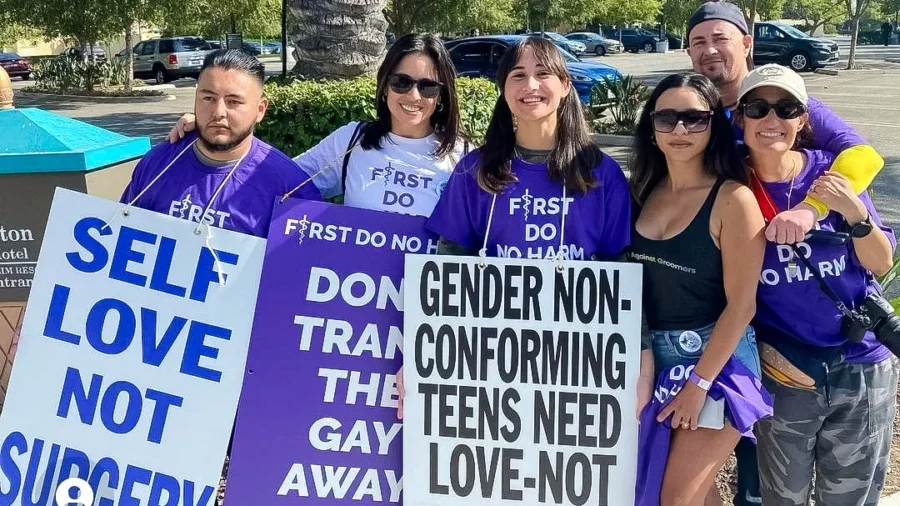The 8th U.S. Circuit Court of Appeals heard arguments over the nation’s first ban on gender transition procedures for minors on April 11.
Arkansas is appealing a lower court’s ruling striking down its Save Adolescents From Experimentation (SAFE) Act as unconstitutional.
The law passed in 2021, prohibits doctors from providing puberty blockers, hormone therapy, or gender transition surgeries to anyone under 18.
Last June, U.S. District Judge Jay Moody permanently blocked the law, holding that it violated the due process and equal protection rights of transgender minors and their families.
He also found that the law violated the First Amendment rights of medical professionals by barring them from referring patients elsewhere.
But attorney Dylan Jacobs, representing Arkansas, held on April 9 that the U.S. Constitution does not grant parents the right to subject their children to potentially harmful medical procedures.
“This case is about whether the Constitution compels states to allow life-altering gender transition procedures to be performed on minors.
“Two courts of appeals analyzing the same claims at issue here have held that it does not,” Mr. Jacobs noted before the full court.
In August, an Alabama ban on gender transition procedures for children was upheld by the 11th Circuit Court of Appeals.
The court, citing the U.S. Supreme Court’s Dobbs decision on abortion, held that the Constitution does not confer a “fundamental right” to such treatments.
That decision, which is being appealed, was followed a month later by a 6th Circuit ruling allowing similar bans in Kentucky and Tennessee to remain in effect as challenges to those laws proceed.
“This court should follow the reasoning of the 6th and 11th Circuits and hold that Arkansas’ law does not discriminate based on sex, it does not discriminate based on transgender status, and it does not run afoul of any parental rights secured by the Constitution,” Mr. Jacobs argued, asking for a reversal of the lower court’s ruling.
Claims of Discrimination
The law’s challengers include the families of four transgender minors and two medical providers.
Arguing on their behalf was ACLU attorney Chase Strangio, who charged that the law discriminates on the basis of sex in that it only applies to treatments for gender transitions.
“By the statute’s plain text, it hinges its prohibition on whether a treatment departs from what is deemed typical of an individual’s birth sex,” said Ms. Strangio, who identifies as a transgender male.
The attorney noted that Supreme Court precedent dictates heightened scrutiny when the government imposes a classification based on sex or gender identity.
“In Bostock, the Supreme Court told us that line-drawing based on the fact that a person had one sex at birth and has a different sex today is line-drawing based on sex.
“That logic-based reasoning applies with equal force here,” Ms. Strangio contended.
U.S. Justice Department attorney Barbara Schwabauer backed Ms. Strangio in her arguments.
The law in question, Ms. Schwabauer argued, is “equivalent to the ban of abortion, for purposes of equal protection.”
The Supreme Court has held that “any law that bans abortion does not ensure it’ll be classified on the basis of sex because there is no person other than a female, assigned at birth, who can have an abortion,” she noted.
“So, an abortion ban cannot distinguish between men and women and the procedure of abortion. That is simply not true here.”
Mr. Jacobs, however, held that the law does not discriminate based on sex but rather on the age of the person seeking treatment and the purpose of the procedures being sought.
“The doctor does not need to know a minor’s sex to determine whether the act, the SAFE Act, restricts a doctor’s decision to prescribe a given drug to a given minor,” he noted.
Mr. Jacobs also held that the law does not discriminate based on transgender status as some people who seek such procedures later “de-transition” after concluding that they are not transgender.
Parental Rights
Another focal point of the hearing was the subject of parental rights.
Ms. Strangio argued that Arkansas’ law infringes on a parent’s right to direct their child’s medical care.
But the court challenged that notion, questioning if the situation was any different from barring parents from providing their children with alcohol.
Ms. Strangio replied that the right of parents to make medical decisions for their children “has been circumscribed by the Supreme Court,” whereas no such right has been upheld with respect to alcohol.
But Mr. Jacobs’s position was that a legislature can regulate medical treatments for minors in cases where it has “a rational basis for doing so.”
“Generally applicable regulations of pediatric medicines are not subject to any sort of heightened review under either the equal protection clause or the court’s substantive due process doctrine,” he argued.
The court appeared amenable to that line of reasoning.
Gender Claims Scrutinized
While the judges questioned the arguments of both parties, they seemed more dubious of the law’s challengers.
For instance, the claim that sex is “assigned at birth” but that gender identity is an immutable characteristic was met with skepticism from one judge.
The question was also raised as to whether the district court’s finding that gender identity is not solidified until near the end of puberty—potentially at around age 18—posed a problem for Ms. Strangio’s case.
The attorney, however, said that finding was “irrelevant” as the district court also found that it was rare for a child to change their mind about their gender identity after reaching puberty.
It is not known when the court will hand down its decision, but it might not have the final say. The case could end up before the U.S. Supreme Court, which has already been asked to block other such laws.
The case, whatever the outcome, will have widespread consequences. At least 24 other states have passed similar laws, and most have been challenged in court.
The Associated Press contributed to this report.
From The Epoch Times


